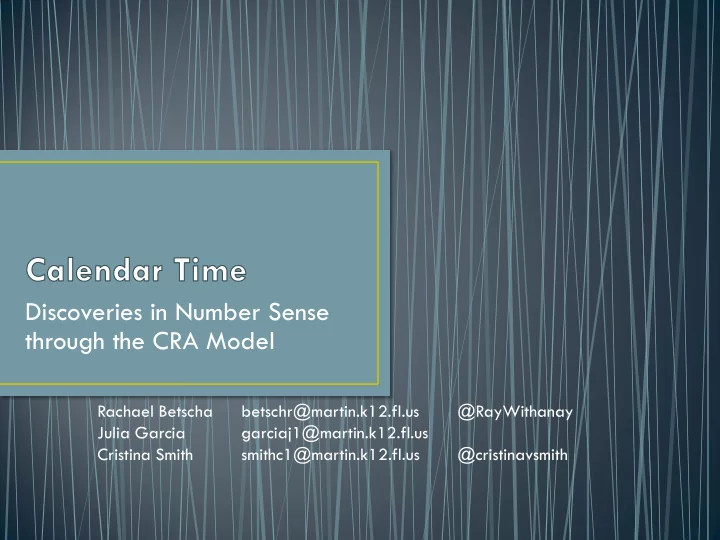

Discoveries in Number Sense through the CRA Model Rachael Betscha betschr@martin.k12.fl.us @RayWithanay Julia Garcia garciaj1@martin.k12.fl.us Cristina Smith smithc1@martin.k12.fl.us @cristinavsmith
• To build an understanding of foundational early number concepts • To build an understanding of the Concrete, Representational, Abstract sequence • To practice calendar-based activities designed to support learning of early number concepts • Raffle!!
• What work do we do? • Classroom teacher • Instructional coach • Administrator • District personnel • Is calendar time part of your math instruction? • How mathematically meaningful is calendar time in your classroom? Why?
• In 2009, the National Research Council stated that, “using the calendar does not emphasize foundational mathematics”.
Economically 26% Disadvantaged 74% Non- Economically Disadvantaged
English Language 40% Learners 60% Native English Speakers
Florid rida a Kinde derg rgar arte ten n Re Read adines ess s Sc Screener er Language & Literacy Math 47% 37% 16% 5% Port Salerno Elementary Martin County School District Average
• Student-driven • Rich and meaningful conversations about numbers • Build language
• Foundational Mathematics Content in Number for Early Learners • According to the National Research Council’s Committee on Early Childhood Mathematics, there are three core areas of foundational mathematics content in number for early learners. • Number • Relations • Operations Van de Walle, 2013
• Based on Bruner’s reasoning theory • C oncrete-using manipulatives • R epresentational-using drawings or pictures • A bstract-using numerals or mentally solving problems Van de Walle, 2013
• Verbal counting • Standard list of counting words in order • One-to-one correspondence between counting sequence and objects • Cardinality • Last word count identifies the amount in the set • Ordinality • Each number is one more than the previous number; the new quantity is embedded in the previous • Concept of Zero • Count of zero indicates nothing in set • Counting on and counting back • Counting forward and back within the number sequence from any given number Van de Walle, 2013
Counting with number paths Counting with number lines • We already have 18 beads because yesterday was November 18 th . • If I gave you one more bead, how many beads would you have?
Building a ten • Make the number 18 on your ten frames. • How did you make 18?
Fluency through five • How many do you have colored in? • How many more do you need to make 5?
• 4 types of number relationships that children can and should develop • One and two more, one and two less • Anchors, or “benchmarks” of 5 and 10 • Part-part-whole relationships • Spatial Relationships • Pre-place-value concepts with numbers 10-20 Van de Walle, 2013
Building a ten • Make 15 using your tens frames and beads. • How many more do you need to make another 10? • How did you figure that out? Make a ten using your pipe cleaners and beads .
• Teaching students to see mathematical situations in their day-to-day life using calendar. • Proper sequencing to support students full grasp of the meaning of operations is very important: Result unknown problems are the easiest, progressing to change unknown problems and then to start unknown problems Van de Walle, et. al 2014 & Carpenter, et.al., 1999
Story problems about the calendar • Join Change Unknown: Today is November 19 th , we know that Thanksgiving is on November 26 th . How many days do we have until Thanksgiving? 19 + __ =26 How would you solve this problem?
Hundreds chart counting • Join Change Unknown: We have been in school for 46 days. How many days until we have a party on the 100 th day of school? 46+ __ = 100 • How would you solve this problem?
• Making numbers real • Using the calendar to build early numeracy concepts allows for immediate real-world application • It’s two more day’s until Juana’s birthday! • Reflect: • What activities do you currently use to reinforce early number concepts? • How can you include additional activities to reinforce early number concepts and make math more meaningful?
mathcoachscorner.com mathematicallyminded.com
• Rachael Betscha betschr@martin.k12.fl.us @RayWithanay • Julia Garcia garciaj1@martin.k12.fl.us • Cristina Smith smithc1@martin.k12.fl.us @cristinavsmith
Recommend
More recommend